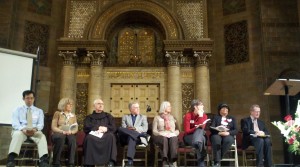
Each year a different Christian culture is chosen by the Pontifical Council for Promoting Christian Unity for this week. This year, the Student Christian Movement of India was invited to fulfill this purpose of choosing the text. The students in India chose this text because they believe the search for Christian unity must be associated with the dismantling of caste systems and allowing the contribution to unity by the poorest of the poor. Having made two long mission trips to India I was delighted to preach from the text knowing how it had been chosen. It powerfully spoke to my heart and I can only hope my sermon was just as powerfully spoken to the several hundred Christians who joined us for this remarkable unity event.
Micah is one of the canonical minor prophets, having lived in the latter half of the 8th century, BCE. His work is called a “minor” prophet only because of its size, or number of pages. Micah was, in fact, a contemporary of Isaiah. Isaiah was an urban man who lived in the capital city but Micah was a simple farmer who lived 20 miles southwest of the capital, a city he likely visited now and then to buy and sell.
What we encounter here in Micah 6 is a dramatic scene. It is a kind of grand court-room drama. What is pictured here is a:
*Heavenly courtroom
*Micah is seen as the court reporter
*Israel is the accused
*God is the prosecutor
To grasp the context of the words of this text you should read Micah 6:1–5 (NRSV).
Hear what the Lord says, Rise, plead your case before the mountains, and let the hills hear your voice. Hear, you mountains, the controversy of the Lord, and you enduring foundations of the earth; for the Lord has a controversy with his people, and he will contend with Israel.
“O my people, what have I done to you? In what have I wearied you? Answer me. For I brought you up from the land of Egypt, and redeemed you from the house of slavery, and I sent before you Moses, Aaron, and Miriam. O my people, remember now what King Balak of Moab devised, what Balaam son of Beor answered him, and what happened from Shittim to Gilgal, that you may know the saving acts of the Lord.”
Micah’s generation had transformed the covenant into a contract! This can be plainly seen in 6:6–7 (NRSV).
“With what shall I come before the Lord, and bow myself before God on high? Shall I come before him with burnt offerings, with calves a year old? Will the Lord be pleased with thousands of rams, with ten thousands of rivers of oil? Shall I give my firstborn for my transgression, the fruit of my body for the sin of my soul?”
There is a “representative worshipper” put before us here who seeks to establish a price for winning God’s favor by raising the bid higher and higher. With each offer the price rises. Outwardly, this worshipper appears spiritual, gifts in hand. But his questions are an insult to God. Why?
This representative worshipper is blind to God’s goodness, his true character. He reasons from his own depraved frame of reference. He doesn’t need to change, God does. This is religion and ritual at its worst.
Tomorrow: Part 2 on Micah 6 and the Week of Prayer for Christian Unity
Related Posts
Comments
My Latest Book!

Use Promo code UNITY for 40% discount!






